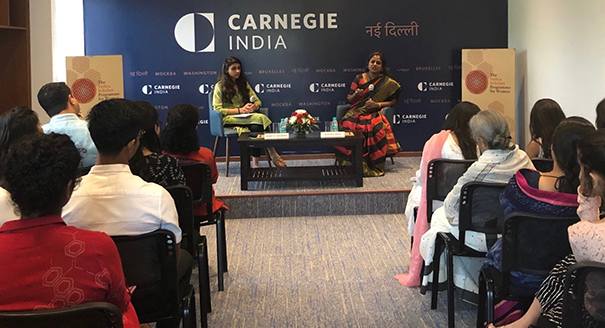{
"authors": [
"Kavita Devi",
"Shruti Sharma"
],
"type": "event",
"centerAffiliationAll": "",
"centers": [
"Carnegie Endowment for International Peace",
"Carnegie India"
],
"collections": [],
"englishNewsletterAll": "",
"nonEnglishNewsletterAll": "",
"primaryCenter": "Carnegie India",
"programAffiliation": "",
"programs": [],
"projects": [],
"regions": [
"India"
],
"topics": [
"Domestic Politics"
]
}
Reporting on the Ground: The 2019 Indian General Elections
Wed, June 12th, 2019
New Delhi
The Anahita Speaker Series, an initiative by Carnegie India and the Vedica Scholars Programme for Women, is a monthly women’s speaker series that aims to highlight the experiences and achievements of women professionals who are giants in their fields.
The 2019 Indian general elections were watched closely by various domestic and international media channels to understand the intricacies of the world’s largest democracy. A domestic media house at the forefront of reporting on the 2019 Indian general elections and voicing the grievances of the public was Khabar Lahariya, India’s only women-led rural media channel. Rural reporting in India requires a specialized understanding of rural spaces, as well as their local populations.
In the third edition of the Anahita Speaker Series, Kavita Devi, digital head and co-founder of Khabar Lahariya, explained the inner workings of a domestic media house and explored the dynamics of women navigating the distinctive space of rural journalism. The discussion was moderated by Shruti Sharma, a research analyst with the Carnegie Endowment for International Peace’s Technology and International Affairs Program.
Discussion Highlights
- The 2019 General Elections: Participants discussed India’s voting pattern during the 2019 Lok Sabha elections. They noted that the voter turnout among women and young voters was higher than the previous general elections and agreed that this indicates an effort on the voters’ part to have their voices heard. This was also a result of political parties undertaking targeted marketing campaigns that focused on issues of interest to women, including safety, and easier access to water, gas, and electricity, participants added. Apart from these local issues, participants emphasized that the defining issue for rural voters was national security.
- Education in Rural India: Participants stated that women in rural areas face an uphill battle to access education, due to conservative social values. Along with the importance of support from family members, they highlighted the role that Non-Governmental Organizations (NGOs) play in facilitating women’s education. They noted that, by reaching out to local government bodies, these NGOs have assisted young girls and women in gaining an education through private education centers where contact hours are flexible to accommodate the lifestyle of these young women.
- Women in Journalism: Participants explained that journalism in India is generally considered to be a male-dominated field. Further, they highlighted that within rural reporting in India, Khabar Lahariya remains the only women-led media channel in the country. They also noted other factors that hinder women entering the profession, such as battling the assumption that women are too “soft and gentle,” to be in a field that is considered masculine. In consequence, they agreed that women who enter this field must be extremely motivated in order to overcome hardships. They suggested that women need to actively support other women who hope to enter journalism by actively reaching out to young women and explaining the merits of the profession whilst creating a socially conducive environment for women to partake in it. More specifically, they noted the importance of training women who undertake rural reporting. Participants also highlighted the training should include, but not be restricted to, elementary training in navigating rural spaces, interacting with local populations, and specialized trainings (such as, in photography) for focus groups.
- Rural Journalism: Participants asserted the importance of rural reporting in India. They acknowledged that urban newspapers and media houses have consistently overlooked the rural population and experiences. As examples, they highlighted the lack of coverage on farmers and the Dalit community. The participants agreed that, by focusing on the issues faced by these local populations, rural media networks provide the local populations with a sense of agency.
This event summary was prepared by Upasana Sharma, a research intern at Carnegie India.
Carnegie does not take institutional positions on public policy issues; the views represented herein are those of the author(s) and do not necessarily reflect the views of Carnegie, its staff, or its trustees.
Event Speakers
Kavita Devi
Shruti Sharma
Former Associate Director, Fellow, and Chief Coordinator, Global Technology Summit, Technology and Society Program

Shruti Sharma was an associate director and a fellow with the Technology and Society Program at Carnegie India, where she is currently working on exploring the challenges and opportunities in leveraging biotechnology to improve public health capacity in India. Additionally, she is the Chief Coordinator of Carnegie India's Global Technology Summit.
